At the Italian Folk Art Federation of America, we bring together Italian folk performing groups and anybody interested in Italian culture and heritage together. We research Italian folklore, traditions, costumes, dances, songs, instruments.
IFAFA is an outgrowth of an Italian Folk Art Project initiated in 1977 at the Nationalities Service Center (NSC) of Philadelphia. With the assistance of the NSC and the leadership and dedication of Cav. Elba Farabegoli Gurzau, IFAFA was incorporated on May 7, 1979, in the Commonwealth of Pennsylvania as a nonprofit cultural and educational organization.
IFAFA is a member of the Federazione Italiana di Tradizioni Popolari (Italian Federation of Popular Traditions) in Rome, Italy.
Member Groups
IFAFA has many participants throughout the United States and Canada. The following groups are current members of IFAFA. Some of their web sites may currently be under construction – if you’d like information about a group which does not yet have a web site link, please send a message to Mark DeSanctis, President of IFAFA.
If you are a performing group or supporting organization, and do not see your name listed, please be sure to Join IFAFA!
Amici ItalianiLocation: Rockford, IL |
|
Balliamo!Location: Sacramento, CA |
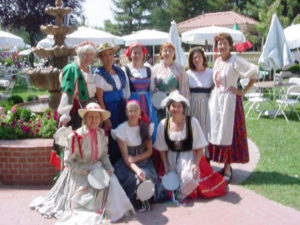 |
Cuor d’ItaliaLocation: Hartford, CT
Email Contact: Pauline Kavanagh |
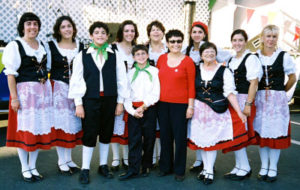 |
Gruppo Folcloristico Ricordi d’ItaliaLocation: Waltham, MA |
|
Gruppo Il Trattenimento ItalianoLocation: Des Moines, IA
Email Contact: Patricia Civitate |
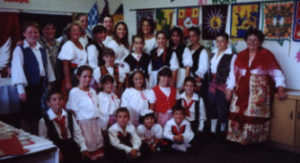 |
I Colori ItalianiLocation: Dallas, TX |
|
I Gagliardi ItalianiLocation: Canton, OH |
|
Il Coro AlpinoLocation: Buffalo, NY |
|
Il Quartiere ItalianoLocation: San Francisco, CA |
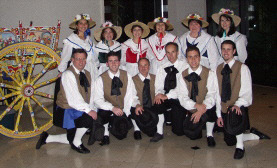 |
| Italian Cultural Society of Sacramento Website |
|
Italian Folk Dancers of MadisonLocation: Madison, WI |
|
San Giovanni DancersLocation: Columbus, OH |
|
SollevantiEmail: Ann Delaurentis |
|
Tarantella Dancers of St. PetersburgEmail: Rosalie Gallina |
|
Tradizione ViventeLocation: Milwaukee, WI |
|
Vivaci!Location: Philadelphia, PA |
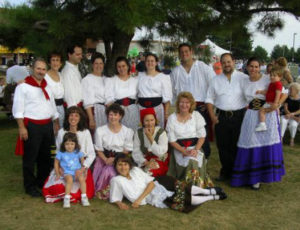 |
History
IFAFA is a member of the Italian Federation of Popular Traditions in Rome.
The Italian Folklore Arts Federation (IFAFA) is the result of an Italian Folk Art Project that begun in 1977 at the Nationalities Service Center (NSC) in Philadelphia.
With the help of the NSC and the direction and devotion of Cav. Elba Farabegoli Gurzau, IFAFA was incorporated on May 7, 1979 in the state of Pennsylvania as a non-profit cultural and educational organization.
IFAFA originally consisted of the following groups
- I Ballerini, Philadelphia, Pennsylvania
- Balli d’Italia, Baltimore, Maryland
- I Campagnoli, Pittsburgh, Pennsylvania
- Il Circolo Dancers, Cherry Hill, New Jersey
- Gruppo Folkloristico Duroniese, USA, North Bergen, New Jersey
- Italian Folklore Group, Montclair, New Jersey
- Italian Folklore Group of Washington, Washington, D.C.
- Italian Folk Ensemble “Ricordi d’Italia”, Fort Lee, New Jersey
- Italian Folk Singers “I Paesani”, Lehigh Valley, Pennsylvania
Founder, Cav. Elba Farabegoli Gurzau
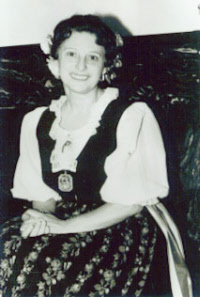
Elba was born in New York City of Italian parents from Tuscany and Emilia-Romagna. At the age of twelve, she went to Italy and began her studies in the city of Florence, subsequently receiving a teaching diploma from the Istituto Magistrale di Bologna.
Upon returning to the United States, Elba continued her studies at New York University, receiving a B.S. in Education. At the university, during the early 1930s, she met Dr. Leonard Covello, who opened the way for her lifetime interest in the folk arts of many countries and, especially, of Italy.
In 1942, Elba moved to Philadelphia to become the Activities Director of the International Institute (now the Nationalities Service Center). She retired after marrying and having a son, but, several years later, she returned to N.S.C. to become the director of English classes for new arrivals. It was during this period that she founded the Folk Dance Leaders’ Council to promote cooperation and to coordinate activities among folk dance leaders in the Philadelphia area.
In 1975, she received her Master’s Degree in Teaching English as a Second Language, and, in that same year, the Italian government bestowed upon her the title of Cavaliere for her contributions to Italians in America and for her book Folk Dances, Costumes, and Customs of Italy. The book was written after much study of material which she gathered from groups she had met at the International Festival of Folk Dance in Venice in 1949. A few years later, the book was revised and expanded. In 2000, IFAFA released a newly-formatted edition of Folk Dances, Costumes, and Customs of Italy.
In 1972, Elba, in cooperation with Sylvia Brecht, organized an Italian folk dance troupe to participate in the Philadelphia Folk Fair. The group later became I Ballerini, a charter member group of IFAFA, and later I Ballerini e le Voci d’Italia. Elba directed I Ballerini e le Voci d’Italia until 1998 at which time she handed the reins over to Paul Torna who had been performing with Ballerini e Voci since 1991. Elba remained involved with the group until her death in June of 2003. In late 2005, the group was renamed Vivaci!, which was the original name that Cav. Elba Gurzau had wanted to give the group.
Expanding on this activity, and with the cooperation of Michael D. Blum, director of the Nationalities Service Center, Elba organized the first Italian Folk Art Conference in the United States in September, 1978. Representatives met from a half dozen Italian performing folk troupes from Pennsylvania, New Jersey, Maryland, and Virginia. Prior to this meeting, none had been aware of the existence of other groups aspiring to the same goals. The event was a tremendous success and a most joyful one, with participants singing and dancing together and sharing with one another. Upwards of sixty participants unanimously agreed to form a national organization to preserve and keep alive Italian folk arts in America. Thus, the Italian Folk Art Federation was founded.
As the first president, assisted by dedicated members of the board — among them, Rita Tonitto, Umberto and Michele Tucci, Michael Rainone, Dr. Anthony Le Pera, Mary Briggs, Jeanette Sias, Don Castronova, and others — she guided IFAFA through the formative stages of incorporation. Upon completing her term, she was elevated to the position of Artistic Director and served in that capacity, keeping a finger on the pulse of all the Federation’s activities, until her death in June of 2003.
Elba’s lifelong vocation generated a home full of papers, files, photographs, books, recordings, correspondence, records, etc. documenting not only her career, but also the numerous organizations she joined or founded to perpetuate folk art. In 1985, the Balch Institute for Ethnic Studies, Philadelphia, became the repository of her materials. “The Gurzau papers ,” says the Balch, “represent a valuable source on the origins of the Italian-American folk art movement and supplement other collections of Italian-American holdings at the Institute, especially those of Dr. Leonard Covello, Elba’s mentor and friend.”